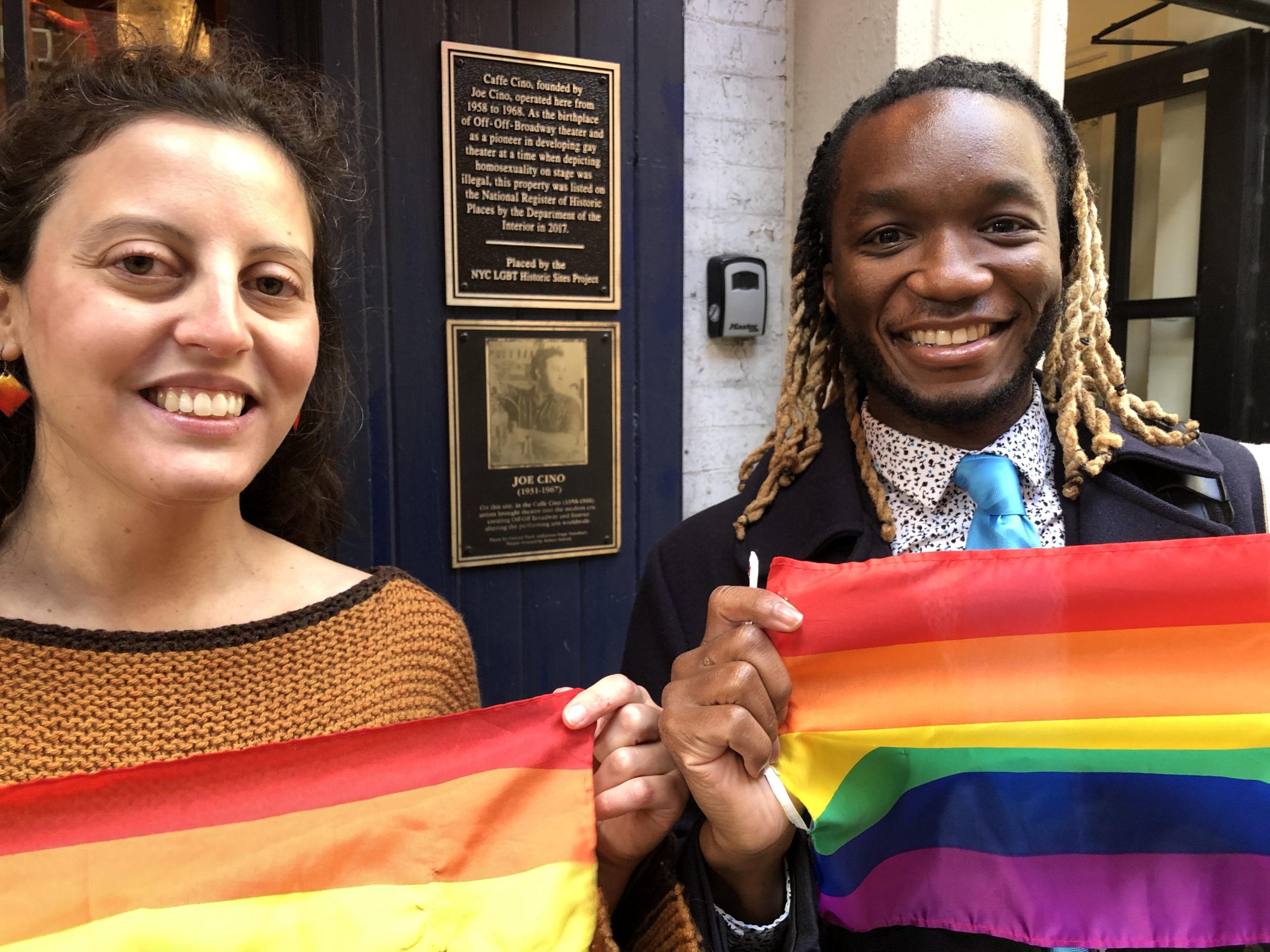Plaque Unveiling at Caffe Cino, on Joe Cino’s 91st Birthday
November 17, 2022
The following remarks were presented by Amanda Davis, NYC LGBT Historic Sites Project manager, at the November 16, 2022 unveiling of the plaque at the former Caffe Cino, celebrating the building on the National Register of Historic Places.
Thank you to everyone who has come out today to celebrate the Caffe Cino, which Joe Cino opened nearly 65 years ago here at 31 Cornelia Street. I’d like to thank David Wilder and the staff of Bombay Bistro for collaborating with us today on this plaque unveiling and to the Cino alums that are here today, especially Magie Dominic, who will be sharing some remarks after me. We would not have been able to list the Caffe Cino on the National Register of Historic Places without Magie’s archive and knowledge of the Caffe Cino.
My name is Amanda Davis, and I’m the project manager of the New York City LGBT Historic Sites Project. We’re a cultural heritage initiative that, since 2015, documents historic places in the city’s five boroughs that have important connections to the LGBT community, from the 17th century to the year 2000. Our website features an interactive map of over 400 places (and counting), and we also give walking tours, host public programs, and advocate for official landmark status to help formalize the significance of LGBT historic sites in New York and American history.

In 2017, we successfully listed the Caffe Cino building to the National Register of Historic Places, in recognition of its significance as the birthplace of Off-Off-Broadway and as a pioneer in the development of gay theater at a time when depicting homosexuality on stage was illegal. The Caffe Cino is one of my favorite sites that I’ve ever researched – a wonderfully quirky, vibrant, and touching story that comes right out of the pages of what Greenwich Village must have been like during the 1960s. For most of the 20th century, this area was very Italian, something that Joe Cino would use to his advantage when he stood here, in December 1958, with his then-boyfriend, Ed, who showed Joe a “for rent” sign on the storefront space at 31 Cornelia Street and introduced him to the landlady, Mrs. Leema, who was looking out her upstairs window. Once they made the connection that she was Italian and Joe was Sicilian, Mrs. Leema said, “I don’t even have to come down, I’ll throw the keys.” And from there, Joe said, in his only known interview, he and Ed “went in and viewed the ruins.” He saw the potential in the tiny room, already envisioning where the counter and coffee machine would go.
The Caffe Cino opened soon after and by 1960, plays were being staged. A year later, playwright Doric Wilson helped establish the Cino as a venue for new work with four plays – two of which included gay themes. The Cino’s breakthrough hit came in 1964 with the staging of Lanford Wilson’s The Madness of Lady Bright, which was centered on an aging drag queen slowly going mad alone in his room. It was so popular that within a year, the Caffe became particularly well known for presenting gay or gay-friendly works. The most successful production here was Dames at Sea, which introduced teenager Bernadette Peters in 1966.
It’s impossible to tell the Cino’s whole story today or even mention the impressive list of theater artists associated with it, but perhaps it’s best summed up by saying that the Cino was a place where Joe Cino encouraged anyone to write about anything they wanted. For gay playwrights, in an era of widespread homophobia, this provided a level of freedom to write gay-themed work at a level never before experience on the New York stage. The Caffe Cino is, as I like to say, a true testament to the arts as a powerful platform for change. In the 1960s, before the Stonewall Uprising and the Gay Liberation era led to increased visibility for LGBT people, gay theater artists at the Cino gave audiences rare public exposure to multi-dimensional and realistic gay characters, and, in doing so, challenged the negative and stereotypical portrayals that had permeated
mainstream theater and film for decades. What we see on stage or on screen very often affects how we view each other and even view ourselves. Although the Cino closed in 1968, following the tragic suicide of Joe Cino a year earlier, the gay theater that it had nurtured continued to evolve with the emergence of gay theater companies, some of which were founded by Cino alums.
We’re honored to be able to unveil the National Register plaque on what would be Joe Cino’s 91 st birthday, and also celebrate the return of the plaque donated by playwright Robert Patrick in 2008.
Pictured, Amanda Davis with Tevin Williams, representing State Sen. Brad Hoylman.